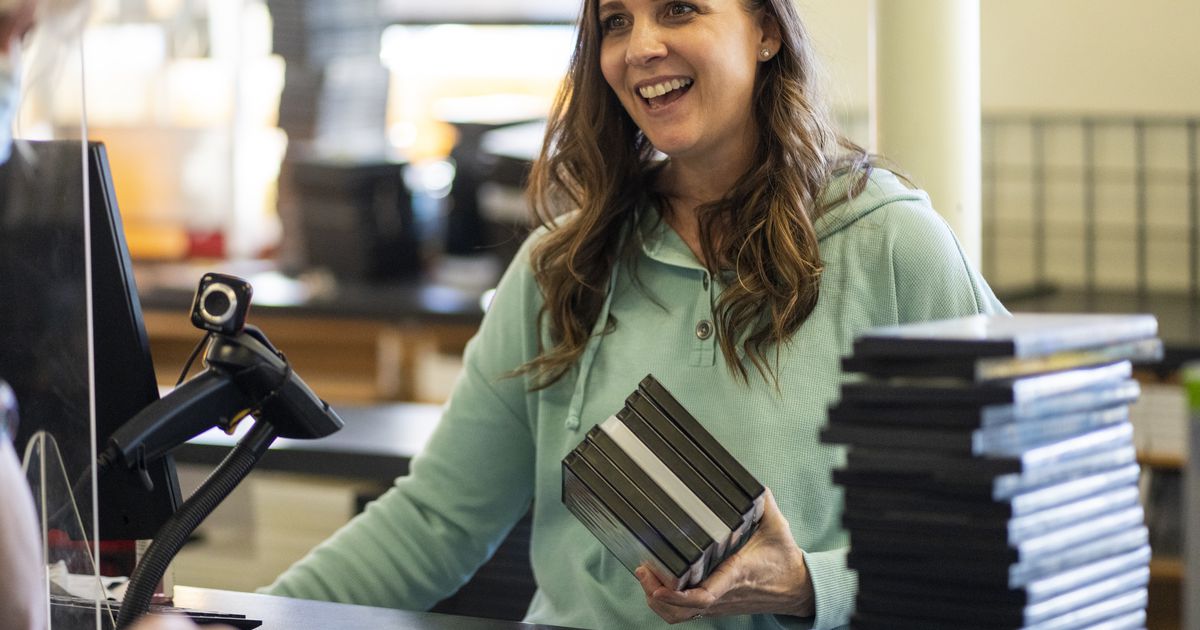
The atmosphere that hangs over the last video-rental store in Utah as it prepares to close for the last time is, fittingly, heavy with nostalgia. And popcorn.
The carpet is worn. Framed posters for classic movies, “Casablanca” and “Gone With the Wind,” hang on green painted walls. The shelves hold some 36,000 DVD and video game titles. The TVs, suspended above the shelves, are on this particular day playing “Footloose” — a classic, in some people’s eyes, that was shot in a Utah city about 40 miles south.
The salty, tempting smell of freshly popped popcorn emanates from the machine behind the counter and lingers in the air. It’s $1 for a small bag, $2 for a large. There’s a wall of movie-night candy, and a fridge full of soda in old-timey glass bottles.
This is where the clerks of Top Hat Video, at 521 W. 2600 South in Bountiful, work as the store gets set to close for the last time on Dec. 31, after 40 years in business.
The video-rental store that its former co-owner, Lona Earl, said in 2018 “could be here ‘til doomsday” has made it through an ownership change and the COVID-19 pandemic. But what’s really bringing on the store’s demise, according to its Facebook announcement of the closure in October, is that “with there being so many ways to consume media digitally, physical media just can’t compete.”
Shanna Earl — the daughter-in-law of Lona and Lee Earl, the original owners — has worked at Top Hat for 27 years. She said that when she told Lona about the closure, Lona got “pretty emotional.”
“It’s different. It’s not like any other job,” Shanna Earl said. “My favorite part, besides having any movie at your disposal, is the relationships.
Earl said people — and she includes herself — grew up at Top Hat. They would bring in their kids, and the cycle continued. The staff has attended customers’ weddings, and their funerals.
Going to a video store is an experience, Earl said. “You make the effort to get in your car, to drive here,” she said. “You have something in mind, or maybe you don’t, and you wander around and then you pick something up and it’s tangible.”
Compare that to how people consume movies and TV programs now. “An algorithm is so impersonal,” Earl said, referring to the computer-driven recommendations that streaming services like Netflix and Hulu use to urge viewers to watch certain shows. It becomes a game, she said, of “mindlessly scrolling through until eventually you kind of settle.”
(Rick Egan | The Salt Lake Tribune) Top Hat Video in Bountiful, the last remaining video rental store in Utah, on Friday, Nov. 11, 2022.
A video store can have constant offerings, she said, where streaming services regularly remove titles from their sites over time. For example, Top Hat has a DVD of the 1995 addiction drama “The Basketball Diaries,” starring a young Leonardo DiCaprio — a movie that’s nearly impossible to find on streaming services.
“Technology is great and when new technology comes it makes our lives easier,” Earl said. “But also there’s a danger to convenience.”
Shanna’s daughter, Matti Earl, who has worked at the store for 14 years, said her family uses streaming services — but there’s something special about coming into the store. There’s an art to finding a movie, holding the case in your hand, reading the synopsis and looking at the cover art.
The heart of the video store, Shanna Earl said, is the video clerk — someone who can make recommendations to customers, based on tastes and preferences that can’t be confined to an algorithm.
Melissa Handley, who now owns the store with David Rees, said what she will miss most about Top Hat is “the feeling I get when I walk in here, of nostalgia, the connection with the people who work here and the community. … That feeling you get in here is going to be gone forever.”
Rees said he sees the preference for streaming services over a brick-and-mortar store as part of a larger pattern that he called “inevitable.”
“People buy more things on Amazon now and they don’t go to a store,” he said. “That’s something that society as a whole is worse off for. We’re all collectively making these decisions that are killing society.”
(Rick Egan | The Salt Lake Tribune) Owners Top Hat Video, Melissa Handley, and David Rees, talk about the video rental business. Top Hat Video in Bountiful, is the last remaining video rental store in Utah, on Friday, Nov. 11, 2022.
The cold mathematics
Rees said the reason he and Handley are closing Top Hat is simple: The store’s monthly revenue can’t cover the monthly expenses.
“When we bought the store two and a half years ago, we knew we would probably lose money,” Rees said. But the losses have become unsustainable, with the store making about $6,000 or so a month on rentals, when running the place costs $15,000 a month.
The store, Rees said, lost a lot of its core audience during the pandemic. That audience included movie nerds, families, older viewers and people who like to browse — and all of them, Rees said, were forced to adapt to streaming services, whose subscriptions skyrocketed when people were forced to stay home.
Cade Handley — who started working at the store before his mom, Melissa, and Rees bought it — said the arrival of Disney+ in November 2019, months before people started hunkering down, was particularly hard on Top Hat.
“It was a recipe for disaster for the video store, with that and COVID,” Handley said. Disney+, “more than any other individual streaming service, was definitely the hardest hit. … People like Disney movies and you couldn’t find them anywhere before. Kids, they have all the time in the world. You have all these movies, ‘Star Wars’ and Marvel.’’
(Rick Egan | The Salt Lake Tribune) Top Hat Video in Bountiful, the last remaining video rental store in Utah, on Friday, Nov. 11, 2022.
Rees said Top Hat had another unique challenge with its location. It’s a 15-minute drive from Salt Lake City to the store, and fewer customers want to make a trip to Bountiful to rent, say, “The Trip to Bountiful.”
Top Hat worked to combat the decline. They rolled out their own subscription service, offering four movies a month for $29; only nine people signed up for it. They tried engaging more on social media, touting their VHS transfer program and starting a movie club to discuss specific film topics.
Those efforts, Cade Handley said, were “equivalent to trying to put tape over the sink so water doesn’t come out.”
The owners and employees held out hope for a “pendulum shift” for video rentals, that the medium would enjoy the same resurgence in popularity enjoyed by other forms of physical media, such as vinyl records.
(Rick Egan | The Salt Lake Tribune) Top Hat Video in Bountiful, the last remaining video rental store in Utah, on Friday, Nov. 11, 2022.
A place to belong
The news of Top Hat’s impending closure brought out messages of love and support, such as the 200 comments made on the store’s October Facebook post.
One was from Weston Clark, who worked at the store for five years in the late 1990s. He admitted that he felt a bit guilty since he now lives in Salt Lake City, and didn’t visit the store as often.
“It became a critical part of my life through some troubling years,” he told The Tribune. Through high school, dealing with his own sexuality and generally feeling lost, he said the store “became this grounding force for me and in my life.”
Clark said he felt like a therapist when he worked there, like he knew everybody’s secrets based on what they rented. Someone’s movie taste, he said, shows a lot about a person.
Clark was still in the closet when he worked at Top Hat, and the welcoming, open culture there helped him, he said. “I had a secret identity and what made it a little easier for me at the video store was [that] there were a lot of people out there that didn’t fit the mold,” he said — such as the Black gay man who worked with him at the store.
Clark’s fondest memory, he said, is of the staff sleepovers in the store at the old Five Points Mall (which was demolished in 2000 to make way for the Renaissance Towne Center). “It was the camaraderie of my fellow employees and the relationships that the owners put together,” he said.
That camaraderie apparently hasn’t faded over the years. When Clark visited the store on a recent November day, Shanna Earl immediately started asking him how his family was doing.
(Rick Egan | The Salt Lake Tribune) Weston Clark talks about the fond memories from the years he worked at Top Hat Video in Bountiful, on Friday, Nov. 11, 2022.
“Lee and Lona made it a family,” Shanna Earl said. “It was never about making money for them, if it was, they would’ve been out a long time ago.”
Earl said she thinks a “backlash to streaming” will happen, and “people are going to start to feel it when they have to pay for five different streaming channels to watch five different shows.” By then, though, Top Hat will be long gone.
Until then, though, the store continues on. Matti Earl, Shanna’s daughter, shows her skill at checking in returned rentals, with a process that’s so rhythmic that it’s mesmerizing. When she was younger, she got paid $20 a day for it.
“It’s hard to imagine it not being around,” Matti Earl said. “It’s a staple in my life. It’s part of my reality. I have to adjust to this unknown.”
(Rick Egan | The Salt Lake Tribune) Matti Earl has been working with her mother, Shanna Earl, for more than 13 years, at Top Hat Video in Bountiful, on Friday, Nov. 11, 2022.
Editor’s note • This story is available to Salt Lake Tribune subscribers only. Thank you for supporting local journalism.








